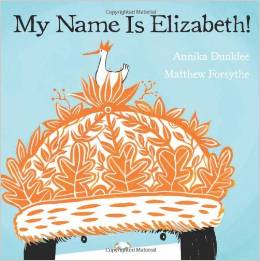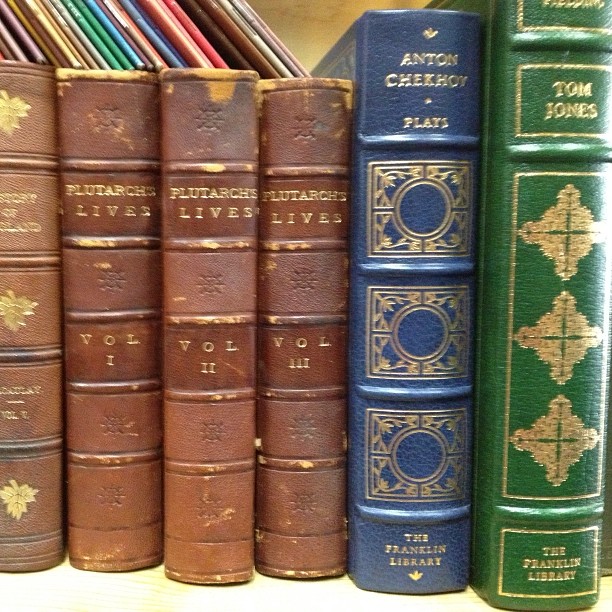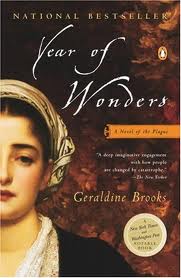It is Wednesday, isn’t it? I’m off kilter somehow.
 Every now and then one of my littles will shout “ELIZABETH!”—I would say ‘for no apparent reason,’ because it’s always a non sequitur, but there is a reason and it’s very apparent: what they mean is “I want to read My Name Is Elizabeth!“ Elizabeth doesn’t like being called Lizzie, Liz, Beth, or Betsy, and although my two youngest children have short names that don’t lend themselves to nicknaming, they wholly sympathize with Elizabeth’s plight, and approve of her insistence on proper nomenclature.
Every now and then one of my littles will shout “ELIZABETH!”—I would say ‘for no apparent reason,’ because it’s always a non sequitur, but there is a reason and it’s very apparent: what they mean is “I want to read My Name Is Elizabeth!“ Elizabeth doesn’t like being called Lizzie, Liz, Beth, or Betsy, and although my two youngest children have short names that don’t lend themselves to nicknaming, they wholly sympathize with Elizabeth’s plight, and approve of her insistence on proper nomenclature.
(They also approve—heartily—of the exception she makes for her little brother.)
Whenever this book is rediscovered, I seem to be called upon to read it several times a day for a week or so. This has been one of those weeks. I’m not complaining. 🙂
***
Just finished e. lockhart’s We Were Liars. Utterly unsettling. I mean that in a good way. More on it later.
***
And a heads-up for you.
I got an email from FutureLearn about this upcoming course—Literature of the English Country House—and I honest-to-God squealed.
We’ll be using a wide range of texts spanning the history of literature from Thomas More’s ‘Utopia’ to Oscar Wilde’s ‘Canterville Ghost’. Along the way we will examine sections from a play by Shakespeare, poetry by Margaret Cavendish, and brief passages from novels by Jane Austen, and Charles Dickens. We will even look at fiction by a country house resident Georgiana, Duchess of Devonshire.
Starts June 2. Thought you might like to know.

As long as I’m keeping a record of daily reading, I figured I ought to keep track of the academic lectures I’m taking in as well.
**Update: I’ve added a comment below explaining a bit about how these courses fit into my day. 🙂
***Update #2, 12/29/14*** Ack! I forgot to come back to this after March. This means I’ve forgotten things. Popped in today to add: A Day’s Read (The Great Courses), lecture 1: Kafka’s “The Country Doctor.”
Recently:
George Eliot: Intellect and Consciousness. Catherine Brown, Oxford.
Darwin and Design, Lecture 1. James Paradis, MIT.
American Novel Since 1945, Lectures 1-13. Amy Hungerford, Yale.
Introduction to Theory of Literature, Lectures 1-3, 5-6. Paul Fry, Yale.
In the past 18 months:
Modern Poetry, assorted lectures (I’m skipping around). Langdon Hammer, Yale.
The Civil War and Reconstruction Era. David Blight, Yale.
History 2D: Science, Magic, and Religion, Lectures 1-4. Courtenay Raia, UCLA.
MOOCs in progress with kids:
Moons, The Open University FutureLearn.
Shakespeare and His World (selected videos), University of Warwick, FutureLearn.
Live!: A History of Art for Artists, Animators and Gamers, California Institute of the Arts, Coursera.
Coursera courses on my own, in progress or last fall:
Scandinavian Film and Television. Multiple instructors, University of Copenhagen. Course in progress. Have watched vids for weeks 1-3 so far. Will probably not get all the way through before the course ends, as these lectures are a bit drier than others I’ve tried, but they’re quite interesting and I’m enjoying them—they just require a bit more focus because the visuals are very important (obviously).
Human Evolution: Past and Future. John Hawks, University of Wisconsin-Madison. Course just ended. Watched about half the videos. Loved how the professor traveled to various digs and fossil sites.
Plagues, Witches, and War: The Worlds of Historical Fiction. Bruce Holsinger, University of Virginia. Watched all videos, read several of the books. Great course!
Climate Literacy: Navigating Climate Change Conversations. Sarah Burch & Sara Harris, University of British Columbia. Did about 75% of the course—videos and readings. Showed several of the video lectures to my teens. I wish everyone I know would take this class. Hope it will be offered again.
Modern & Contemporary American Poetry. Al Filreis, University of Pennsylvania. Watched about half the videos, did corresponding readings. I adore this course and look forward to taking it again—in full this time—in the fall.
A Brief History of Humankind, Yuval Noah Harari, Hebrew University of Jerusalem. Lectures 1-4.
The Modern and the Postmodern. Michael Roth, Wesleyan University. Weeks 1-5. The reading load got to be more than I could juggle at that point in time but I very much enjoyed the lectures I watched.
CodeAcademy tutorials:
jQuery (23% completed)
Web Projects (89% completed)
HTML & CSS (completed)
***
There are so many appealing courses in literature alone (see this big list at Open Culture), not to mention all the classes I’d like to take in anthropology, history, art history, and various sciences. The Tolkien Professor’s Faerie and Fantasy class sounds especially fun! We were discussing these courses on Twitter this evening and a friend mentioned that she’d love to take one of these, but would be unlikely to finish. I seldom complete an entire course, as my Coursera record above demonstrates. But that doesn’t concern me; I consider each lecture I listen to a gain. I ran out of time to listen to all the Human Evolution lectures, but I learned a vast amount from the ones I did manage to watch. Ditto all the above. I’m exactly halfway through Amy Hungerford’s series on the modern American novel, and while I certainly hope to listen to the rest of the lectures, even if I don’t get back to them I’ve already gained a tremendous amount in terms of new knowledge and food for thought. This is unschooling for adults, and it’s exhilarating—learning as process, not product (that same philosophy that informs our homeschooling life).

I’ve written before about our great experiences with various MOOCs one or more of us has taken via Coursera. Here’s another list of offerings, this time from FutureLearn.com. Courses that have caught my eye include:
• Moons— “Explore the many moons of our Solar System.” This has Beanie written all over it. Eight weeks, starts March 17. The Open University.
• Kitchen Chemistry— “Along the way you will use fruit tea to identify acids and alkalis, investigate chemicals that speed up reactions and experiment with electron transfer reactions. This should give you a feel for the world of molecules and an idea of some reactions. It should also introduce some methods to separate chemicals, to find out what chemicals are present in a mixture and ways to change chemicals from one form to another.” Six weeks, starts in April. University of East Anglia.
• England in the Time of Richard III! Exclamation point mine. “Explore 15th century England through archaeology, history and literature against the backdrop of the excavation of Richard III.” Yes, please. Methinks it’s time to introduce Rose and Beanie to Josephine Tey’s Daughter of Time—a compulsive reread for both Jane and me—as a backdrop to this course. Six weeks, starts mid-2014. University of Leicester.
Those plus the Courseras we’re already signed up for—including a History of Art for Artists, Animators, and Gamers via CalArts, which is just getting rolling—may tide us over until the next iteration of ModPo kicks off in September. Boy do I love sending my kids to college around the world in our own living room.
November 22, 2013 @ 9:31 am | Filed under:
Books  The historical fiction course I’m taking at Coursera continues to delight me, and this week’s Geraldine Brooks seminar on her plague novel, Year of Wonders, pretty much knocked my socks off. The professor, Dr. Bruce Holsinger of UVA, posted a long excerpt from what was also my favorite part of the seminar–Brooks on how she writes characters from other eras, how she forms their consciousness.
The historical fiction course I’m taking at Coursera continues to delight me, and this week’s Geraldine Brooks seminar on her plague novel, Year of Wonders, pretty much knocked my socks off. The professor, Dr. Bruce Holsinger of UVA, posted a long excerpt from what was also my favorite part of the seminar–Brooks on how she writes characters from other eras, how she forms their consciousness.
“And as a foreign correspondent in the contemporary world, I would hear people all the time saying, ‘They’re not like us.’ One side saying about the other—white South Africans about black, Palestinians about Israelis—‘Their values are different, they don’t love their kids, they’re willing to sacrifice them, they don’t have the same material needs that we have,’ and it’s all BS in my view. You know, the sound of somebody keening for a dead child, is exactly the same, no matter if they’re in a…New York apartment, or an Eritrean refugee camp. There’s a fundamental belief that the human heart hasn’t changed that much. … At a time when you couldn’t expect to raise your kids, when death was ever present, there would’ve been a different approach to loss. But I don’t think it felt any different, I don’t think the emotion of loss felt any different, and I don’t think hatred felt any different, and I don’t think love did. And so, that for me is, where you start, with believing that human beings have these strong emotions in common. And that, that is more crucial to shaping consciousness than the furniture in the room. So, that’s my conviction about historical fiction, and it … drives everything for me.”
There’s more, well worth the click-through. And if you sign up for the course (free), you can watch the videos. Such a treat to hear smart people talk about their work. Author Jane Alison’s seminar on her Ovid novel, The Love Artist, was also fascinating and thought-provoking. I haven’t yet watched the Katherine Howe videos (The Physick Book of Deliverance Dane)—greatly looking forward to it. Dr. Holsinger’s lectures have captivated me, to a one. Lots of peeks at rare first editions from UVA’s special collections library (swoon) and really excellent, meaty discussion of various historical fiction novels in their own historical context: Tale of Two Cities, Clotel, Anna Katharine Green‘s detective novel The Forsaken Inn (new to me, and the genesis of a subgenre, historical mystery). Dr. Holsinger even has me wanting to give James Fenimore Cooper another shot, which is saying something.
Looking forward to upcoming seminars on Mary Beth Keane’s Typhoid Mary novel, Fever, and Yangsze Choo’s The Ghost Bride.
• Plague, Witches, and War: The Worlds of Historical Fiction •
 Every now and then one of my littles will shout “ELIZABETH!”—I would say ‘for no apparent reason,’ because it’s always a non sequitur, but there is a reason and it’s very apparent: what they mean is “I want to read My Name Is Elizabeth!“ Elizabeth doesn’t like being called Lizzie, Liz, Beth, or Betsy, and although my two youngest children have short names that don’t lend themselves to nicknaming, they wholly sympathize with Elizabeth’s plight, and approve of her insistence on proper nomenclature.
Every now and then one of my littles will shout “ELIZABETH!”—I would say ‘for no apparent reason,’ because it’s always a non sequitur, but there is a reason and it’s very apparent: what they mean is “I want to read My Name Is Elizabeth!“ Elizabeth doesn’t like being called Lizzie, Liz, Beth, or Betsy, and although my two youngest children have short names that don’t lend themselves to nicknaming, they wholly sympathize with Elizabeth’s plight, and approve of her insistence on proper nomenclature.


 The
The